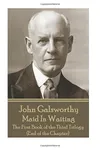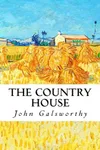Picture an English storyteller who wove tales of love, class, and societal change with a pen as sharp as his wit—meet John Galsworthy! Born in 1867, this Nobel Prize-winning novelist and playwright captured the heart of early 20th-century Britain through his masterpiece, The Forsyte Saga, a sweeping chronicle of an upper-middle-class family grappling with shifting times. With a knack for blending poignant drama and social commentary, Galsworthy’s works remain timeless treasures.
The Making of John Galsworthy
John Galsworthy was born in Kingston upon Thames, England, to a wealthy family, which gave him a front-row seat to the privileged world he’d later dissect. Educated at Harrow and Oxford, he initially pursued law but found his true calling in storytelling. Inspired by the social upheavals of his era and his own empathy for the marginalized, Galsworthy began writing in his late 20s, publishing his first novel, Jocelyn, under a pseudonym in 1898. His early works hinted at the keen observer he’d become, shaped by travels across Europe and a deep love for literature.
John Galsworthy’s Unforgettable Stories
Galsworthy’s crown jewel, The Forsyte Saga, is a multi-generational epic that follows the wealthy Forsyte family as they navigate love, betrayal, and the decline of Victorian values. Published between 1906 and 1921, this trilogy masterfully blends romance and social critique, exposing the rigidity of class and gender norms. His play Strife (1909) tackled labor disputes with gritty realism, showcasing his versatility. Another gem, The Skin Game (1920), explores class conflict through a tense family feud, revealing Galsworthy’s knack for human drama. His style—elegant yet accessible, with sharp dialogue and vivid characters—made complex issues relatable, earning him a devoted readership.
Beyond storytelling, Galsworthy championed reform. His works often highlighted women’s rights, class inequality, and the plight of the working class, reflecting his progressive ideals. This commitment to social justice infused his narratives with purpose, making them both entertaining and thought-provoking. Whether crafting novels or plays, Galsworthy’s ability to mirror society’s flaws while celebrating its humanity set him apart.
Why John Galsworthy Matters
John Galsworthy’s legacy endures through his unflinching portrayal of a changing world. His 1932 Nobel Prize in Literature honored his ‘distinguished art of narration,’ but his true impact lies in how he shaped modern fiction. The Forsyte Saga inspired countless family sagas and remains a touchstone for exploring social dynamics. His advocacy for reform influenced public discourse, cementing his role as a literary voice for progress. Today, readers still find resonance in his themes of love, duty, and societal evolution.
About John Galsworthy
- Born: August 14, 1867, Kingston upon Thames, England
- Key Works: The Forsyte Saga, Strife, The Skin Game
- Awards: Nobel Prize in Literature (1932)
- Died: January 31, 1933
Ready to step into Galsworthy’s world? Snag The Forsyte Saga and dive into his captivating blend of drama and social insight!


















































































